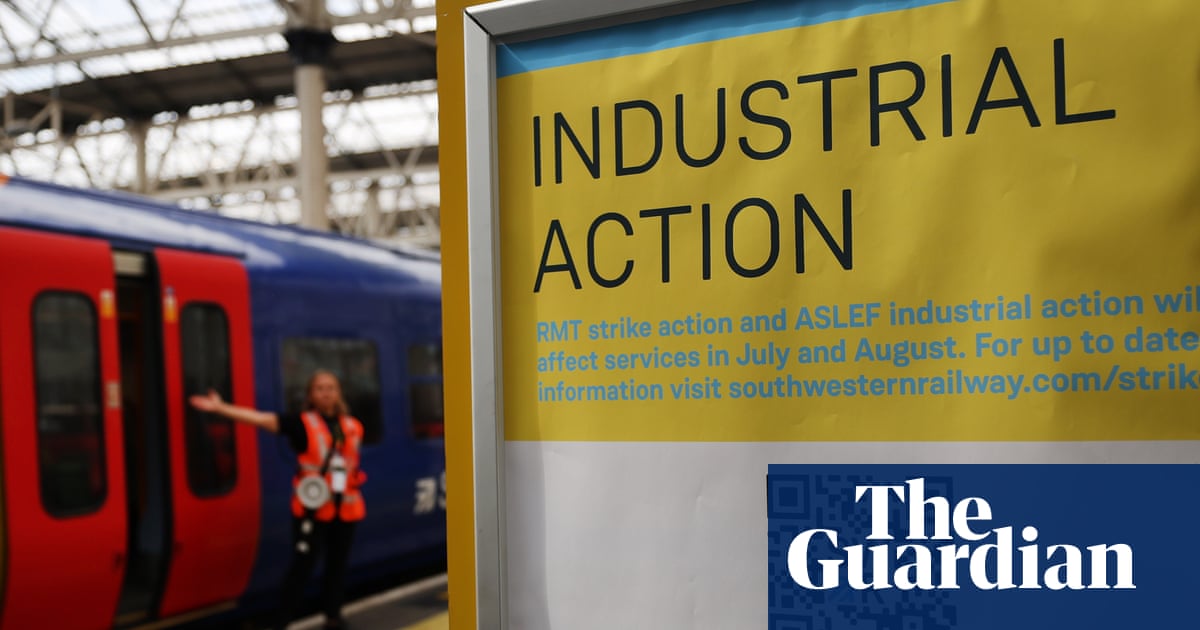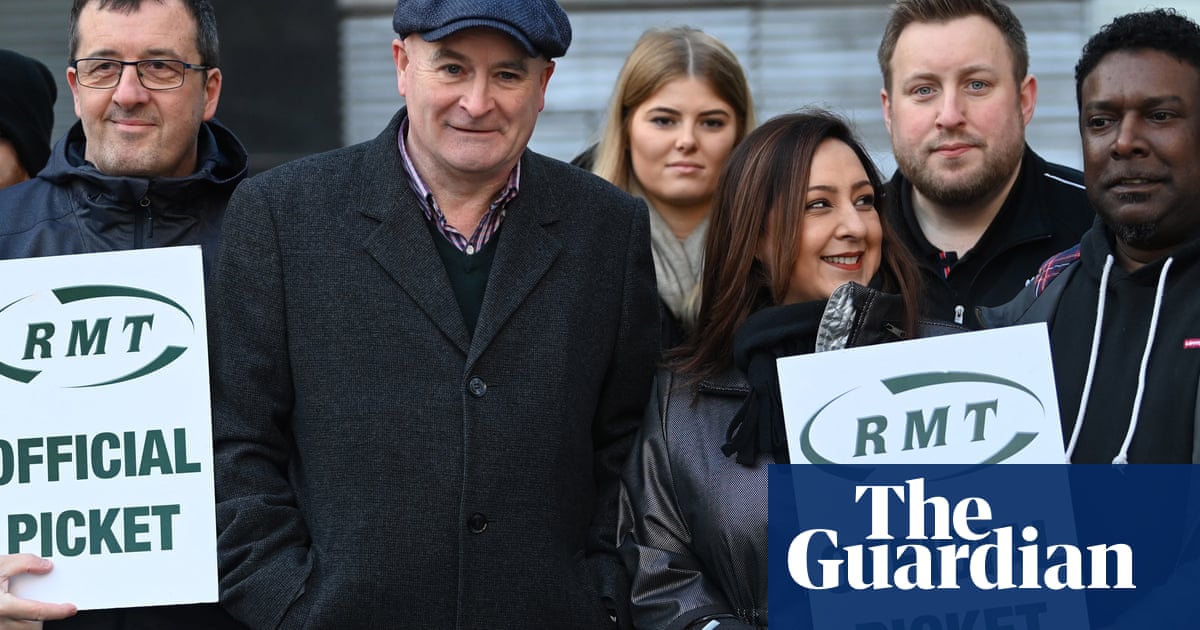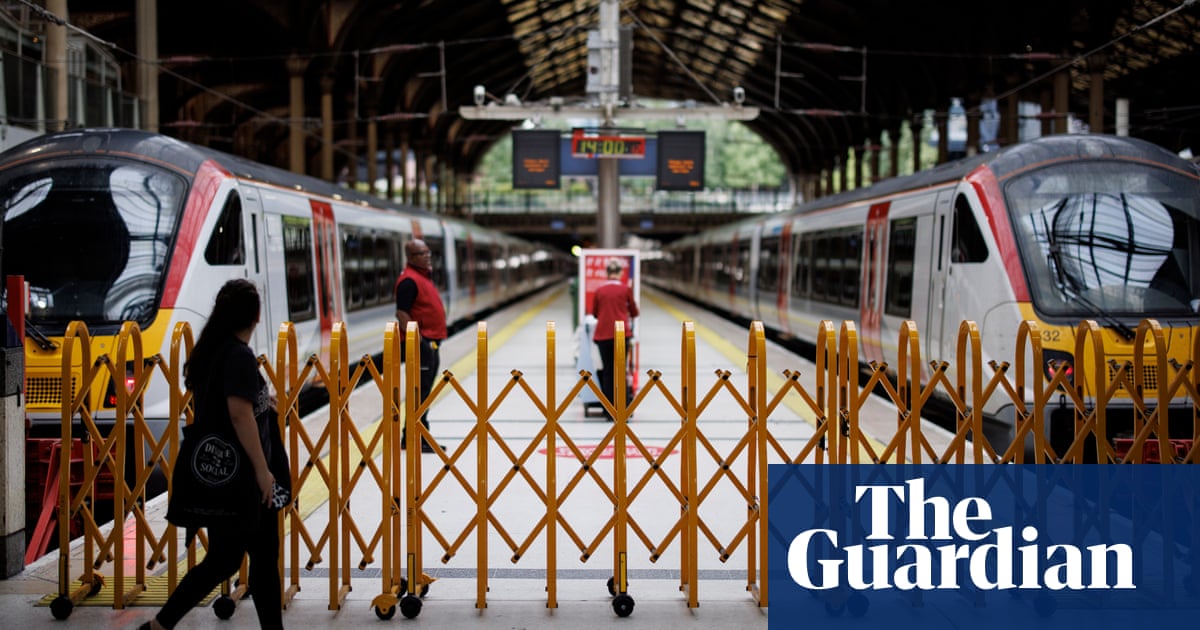
Britain’s railways will be brought to a standstill later this month after the RMT union announced two more 24-hour rail strikes in the long-running dispute over pay and working conditions.
About 40,000 workers at Network Rail and 14 train operating companies will strike on 15 and 17 September.
The first date coincides with the latest Aslef train drivers’ strike announced yesterday and means that virtually no trains will run across much of Britain that day. Limited services on main lines have run during previous RMT strikes.
The September walkouts are likely to disrupt services over four days, and the union said it will “effectively shut down” the rail network on the Thursday and Saturday strike days.
Talks between the union and rail industry have been ongoing but there has been no breakthrough or new offers from either Network Rail or the operators, the union said.
The RMT general secretary, Mick Lynch, said: “Our members have no choice but to continue this strike action.
“Network Rail and the train operating companies have shown little interest this past few weeks in offering our members anything new in order for us to be able to come to a negotiated settlement.”
Lynch said the transport secretary, Grant Shapps, was continuing in a “dereliction of duty” by refusing to negotiate and “shackling the rail industry” from making a deal.
“We will continue to negotiate in good faith, but the employers and government need to understand our industrial campaign will continue for as long as it takes,” he said.
The major effect of the RMT strike is to deprive Network Rail of signallers, disrupting or stopping services across England, Scotland and Wales. Members working for train companies as onboard customer service staff, dispatchers or guards will also strike at Chiltern Railways; Cross Country Trains, Greater Anglia, LNER, East Midlands, c2c, Great Western, Northern, Southeastern, South Western, TransPennine Express, Avanti West Coast, West Midlands Trains and Govia Thameslink Railway.
Andrew Haines, Network Rail chief executive, said: “Frustratingly, the RMT’s decision to call further action means we will again have to ask passengers to stay away from the railway on 15 and 17 September, at a time when we should be focusing on building a railway fit for a 21st century, post-pandemic Britain.”
Haines said Network Rail was doing everything it could to find a breakthrough in talks. He added: “Our latest offer of a two-year 8% pay rise, with heavily discounted travel and a guarantee of no compulsory redundancies, is affordable from within our own budgets, but the RMT remains unwilling to give its members the chance to vote on it despite knowing that members at another union overwhelmingly accepted a similar deal.”
Some Network Rail staff in the Transport Salaried Staffs Association have agreed a pay deal, although others remain in dispute, and the TSSA has also announced a 24-hour strike in late September, coinciding with the Labour party conference.
A Department for Transport spokesperson said that union leaders were again “choosing self-defeating, coordinated strike action” and “jeopardising the future of the railways and their own members’ livelihoods”.
Train operators argue that a 5% pay deal would cost around £280m a year, more than wiping out their entire profit margin.
Steve Montgomery, the chair of the Rail Delivery Group, which represents the industry, said the strikes were “cynically timed to cause maximum disruption to the very passengers the industry depends on for its recovery”.
He added: “We absolutely want to give our people a pay rise and we know they are facing a squeeze – but the RMT must recognise that with revenue consistently at 20% below pre-Covid levels, the only solution lies in long-overdue reforms that will put the industry on a sustainable footing and improve services for passengers.”
The strike dates in full
Thursday 15 September: Aslef and RMT unions both on strike. Virtually no trains will run on most lines, particularly those where drivers are on strike: Avanti West Coast, Chiltern, CrossCountry, Greater Anglia, Great Western Railway, Hull Trains, LNER, London Overground, Northern, Southeastern, TransPennine and West Midlands Trains. Some disruption is likely to persist on the morning of 16 September.
Saturday 17 September: RMT strike – likely to see a limited service on main lines, broadly about 20% of normal schedule between 7am and 7pm. After-effects will result in continued disruption on morning of 18 September.
Monday 26 September: TSSA strike for 24 hours from midday by some members at Network Rail and nine train companies. Unlikely to cause significant disruption.












